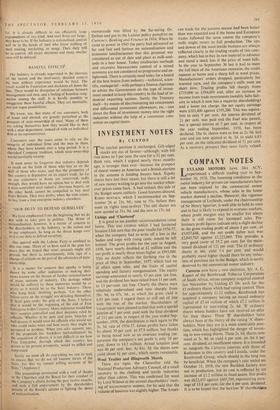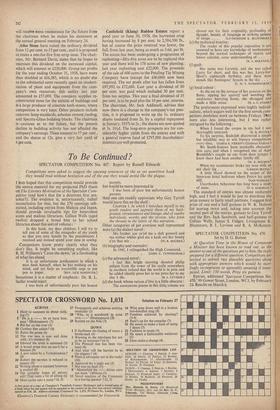COMPANY NOTES
LEYLAND MOTORS have, like ACV„, experienced a difficult trading year to Sep- tember 30, 1958. The booming conditions in the motor industry for private car manufacturers have not been enjoyed by the commercial motor vehicle manufacturers, whose sales in the home market showed a decline. However, the vigorous. management of Leylands, under the chairmanship of Sir Henry Spurrier, is well able to hold its own, and in fact is likely to expand in overseas markets.. where profit margins may be smaller but where there is still room for increased sales. Pre- liminary profit figures indicate only a slight decline in the gross trading profit of about 3 per cent., at £5,937,648, and the net profit (after tax) was £2,045,745 against £2,222,069. This provides a very good cover of 35.2 per cent. for the main- tained dividend of 12! per cent. The £1 ordinary shares at 46s. yield 5.4 per cent. and would probably stand higher should there be any reduc- tion of purchase tax in the Budget, which is surely' deserved by the commercial motor industry.
Carreras now have a new chairman, Mr. A. E. Rupert of the Rembrandt Tobacco Corporation of South Africa, whose company acquired control last November by bidding £5 10s. each for the £1 ordinary shares which had voting control. Thus. for approximately £1.32 million, Rembrandt has. acquired a company having.an issued ordinary capital of £7.44 million of which £7.2 million is represented by non-voting 2s. 6d. 'B' ordinary shares whose holders have not received.an offer for their shares. These 'B' shareholders have always been at the mercy of the voting 'A' share- holders. Now they are in a most unenviable posi- tion, which has highlighted the danger of invest- ing in non-voting shares. These 2s. 6d. shares now' stand at 3s. 9d. to yield 4 per cent. on the 6 per cent. dividend, an insufficient return. It is intended to integrate the Carreras interests with those of Rothmans in this country and Canada, under the Rembrandt Group, which should in the long run be beneficial. When the company's year ended on October 31, 1958, the new Basildon factory was not in production, but its cost is reflected by are increase of £1.2 million in fixed assets. Net prolia was £622,455 against £605,599, representing earn- ings of 13.8 per cent. for the 6 per cent. dividend.. It is to be hoped that the luckless 'B' shareholders: will receive some reassurance for the future from the chairman when he makes his statement at the annual general meeting on February 24.
Atles Stone have raised the ordinary dividend from 12 per cent. to 15 per cent., and it is proposed to make a one-for-five free scrip issue. The chair- man, Mr. Bernard Davis, states that he hopes to maintain• this dividend on the increased capital, which will amount to £220,000. Group net profits for the year ending October 31, 1958, have more than doubled at £66,385, which is no doubt due to the substantial sums recently spent on modern- isation of plant and equipment from the com- pany's own resources; this outlay last year amounted to £57,000. The company supplies re- constructed stone for the outside of buildings and is a large producer of concrete kerb-stones, where competition is very keen. Other products include concrete lamp standards, asbestos cement roofing, and Spectra-Glass building blocks. The chairman is cautious as to the future, but the present decline in building activity has not affected the company's earnings. These amount to 57 per cent., and the shares at 12s. give a very fair yield of 6 per cent.
Castlefield (Kiang) Rubber Estates report a good year to June 30, 1958, the harvested crop having increased by 8 per cent. to 2,504,500 lb., but of course the price received was lower, the fall, from last year, being as much as 3.6d. per lb. The estate has been undergoing a programme of replanting—fifty-five acres are to be replaced this year and there will be 178 acres of new planting; last year replanting cost f22,000. The proceeds of the sale of 600 acres to the Petaling Tin Mining Company have (except for £40,000) now been received. The net profit after tax has fallen from £97,992 to £72,680. Last year a dividend of 80 per cent. was paid which included 30 per cent. from tax surplus. This year a final dividend of 35 per cent. is to be paid plus the 10 per cent. interim. The chairman, Mr. Jack Addinsell, advises that now there is a change in the company's tax posi- tion, it is proposed to write up the is. ordinary shares (reduced from 2s, by a capital repayment in January, 1957) to 2s.; the shares are now quoted at 3s. 102d. The long-term prospects are for con- siderably higher yields from the estates and with a general reserve fund of £297,000 shareholders' interests are well protected.







































 Previous page
Previous page